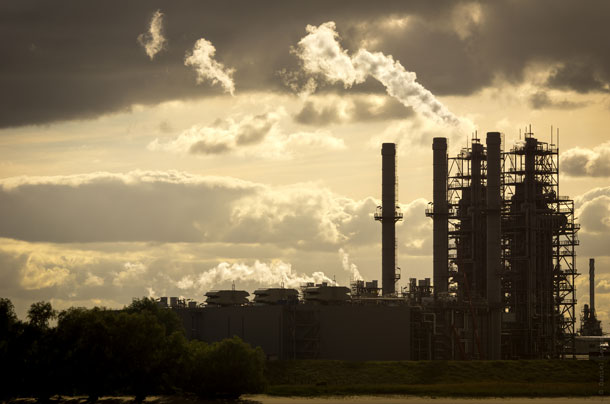Half a Degree Hotter Will Cost $30 Trillion
Air Date: Week of June 1, 2018

An economic analysis finds that the benefits of meeting the most stringent targets set out by the Paris Climate Accord far outweigh the costs. Meeting those targets will require a rapid transition towards more renewable energy sources, such as wind and the development and deployment of ways to extract greenhouse gases from the atmosphere. (Photo: Karsten Würth, Unsplash Creative Commons)
The most ambitious target of the Paris Climate Agreement is to limit global warming to one and a half degrees Celsius above pre-industrial levels, rather than two degrees. Now researchers at Stanford University find that avoiding a half a degree of additional warming could save a whopping $30 trillion of GDP globally. Marshall Burke, an Assistant Professor of Earth System Science who led the study, explained to host Steve Curwood how saving global heat could save trillions.
Transcript
CURWOOD: From PRI, and the Jennifer and Ted Stanley Studios at the University of Massachusetts, Boston, this is Living on Earth. I’m Steve Curwood.
Back in 2015, the Paris Climate Agreement set two goals: Parties agreed that planet warming should in no event be allowed to exceed two degrees centigrade above pre-industrial levels, but it would be better to limit the warming to one and half degrees. At this point the pledges made by individual countries so far will not achieve either goal, but a team based at Stanford University has calculated that the less warming in that half degree of difference could be worth 30 trillion dollars in the world economy. They found that almost all nations would economically benefit from tighter restriction of temperatures and saving the 30 trillion would cost less than a half a trillion. Marshall Burke is an Assistant Professor of Earth System Science at Stanford University who led the study. Welcome to Living on Earth!
BURKE: Thanks a lot for having me.
CURWOOD: So, your research says that it will cost the world some 30 trillion dollars more if we go from one and a half degrees Centigrade to two degrees Centigrade in global warming. Where would that money come from? Who would be charged that 30 trillion dollars?
BURKE: So, the 30 trillion dollar number we have is a global total. So, this is adding up the sort of additional losses we would suffer at two degrees instead of 1.5 degrees around the world. So, think of this as a global number, but importantly we find that these sort of costs, if you will, or benefits – if you – if you want to think about it in terms of staying at 1.5 degrees Celsius – we find that these benefits are unequally distributed. So we find that the largest benefits at least in percentage terms will be in the poorest parts of the world, countries that are already very hot and for whom any additional warming exacts a lot of additional economic damage. So, we find that the benefits will be largest in the tropics.
CURWOOD: So, Marshall, explain that to me. Why will these poor, tropical countries get hit harder? Don't they have less infrastructure?
BURKE: Yeah, so our study is based on a historical understanding of how economies in the past have responded to changes in temperature. So, we have a half-century of data from countries around the world that measure economic output at an annual level. And what we do is we use those data to understand, Okay, historically when the temperature has gone up by a degree Celsius, how much has economic output changed? And what we find when we do that is, if you're a cold country, and you warm up the temperature a little bit, these countries often do a little bit better. You can see this very clearly, for instance, in the Icelandic data. Iceland is a really cold place. If you crank up the temperature a little bit in Iceland, historically Iceland does better in terms of economic output. Now, the opposite is true in hot countries. These countries are already quite hot, and as you crank up the temperature we see large economy-wide impacts of higher than normal temperatures.

Warming from greenhouse gas emissions could make the entire world 10% poorer by the end of the century if it continues at current levels. (Photo: Daniel Lerps, Flickr CC BY-ND 2.0)
CURWOOD: Your study is mainly GDP-focused, and you don't look at specific sectors. But give us some idea of the sectors that would be really hit hard by this increment in warming.
BURKE: Yeah, our study focuses on total economic output, so GDP, Gross Domestic Product, which is just the value of all the stuff that's produced in a country in a given year. But you're right that we might think that changes in climate would affect different sectors differently. Our study doesn't look at that directly, but a sort of a host of other research looks at this.
So, we know that agricultural productivity suffers when it's hot and so this is one reason why it's probably true that poor countries suffer more when the temperature goes up. They're largely dependent on agriculture, and so any losses in agriculture are sort of magnified for them. But the impacts extend, we think, far beyond agriculture, so there's lots of work now showing that even labor productivity in high tech manufacturing suffers when the temperature is higher. We see lower cognitive performance when the temperature is higher. So, kids taking standardized tests do worse when the temperature is hotter on the day of the test, right? So, we see overall declines in cognitive function, and so, these likely have influence on many factors that you know, again, are far beyond agriculture.
CURWOOD: So, you say places like Iceland maybe Russia, Canada, fairly cold places might actually see a little more economic progress with a bit more warming. Can you explain that for us?
BURKE: Yeah, that's right. I think it's easy to start intuitively. So, just think about how comfortable we are at different temperatures as humans, right? We're very comfortable in sort of mild temperatures. We're quite uncomfortable at really cold temperatures and really hot temperatures, right? And so you can imagine if you're in a really cold place, and you warm up the temperature a bit, we're more comfortable and we’re likely more productive. And it turns out, that shows up really clearly in the GDP data of these countries.
CURWOOD: So, you suggest that if we could keep global warming to just one and a half Centigrade, the world would save some 30 trillion dollars between now and the end of the century. What would it cost to save those 30 trillion dollars?
BURKE: That's right. So, our study focuses on the benefits, the economic benefits, of reducing warming basically, of keeping warming at 1.5 degrees versus two degrees Celsius. But you have to weigh that against the costs of meeting these more stringent mitigation targets. So, other folks have tried to calculate the cost, right? What would be the differential cost in terms of how much money do we have to spend to transition our energy sector away from dirty fuels to cleaner fuels, for instance? So, what would be the total economic cost around the world? And the estimates that other folks have come up with are on the order of half a trillion dollars. And so that is basically an order of magnitude lower than what we calculate the benefits to be of undertaking those actions. So, to us, the cost benefit calculation looks wildly favorable for stronger mitigation.
CURWOOD: So, Marshall, one thing that really concerns me about your study is one could argue that it's going to be very tough to hit one and a half degrees Centigrade warming, to limit it to that, given what is going on right now among all these countries that have agreed to the Paris Climate Agreement, not even thinking about the United States which is trying to get out of it. I mean, what are the odds of us being able to achieve these savings that you say that we would have if we could achieve that?

Marshall Burke is an Assistant Professor of Earth System Science at Stanford University. (Photo: courtesy of Marshall Burke)
BURKE: So, the odds of achieving the 1.5 C. target right now are pretty low, and doing so depends on us inventing carbon capture technologies that do not yet exist and deploying those technologies sort of massively such that by mid-century we're actually pulling more carbon out of the atmosphere than we're putting into the atmosphere. So, we need to go sort of net negative in emissions terms by mid-century. So, the optimist in me wants to believe that we can get there and perhaps numbers like ours would suggest that the economic returns of getting there are higher than we thought, but you're right that we are certainly not on path right now to meet these more stringent goals.
But I think bigger picture, what our estimates suggest that any effort we put in to reduce warming is likely to generate large economic benefits around the world. So, right now are headed for three degrees Celsius. If we can keep it below that that's going to generate benefits, if we can go all the way to two, that generates even more benefits. So, what our results again suggest is that there are large benefits from even relatively modest reductions in future warming.
CURWOOD: Some people listening to us would say, “Okay, this is interesting, but how do you put a price on some of the things that are likely to happen in the years ahead if we don't hit this one and a half degree Celsius target?” In this broadcast there is a segment about kids living in the Marshall Islands looking ahead at their future, and at two or three degrees C they have no homeland. Their Marshall Islands are going to be underwater as are a number of other low-lying places. How do you put a price on losing the places that people can live?
BURKE: That's a great question and that is not something that our current approach grapples with very well. So, all we are able to measure in this approach is things that show up in gross domestic product. So, again they’re just the value of the goods and services that are produced in an economy in a year. So, we will not capture many of these other very important things – loss of homeland, loss of habitat, that we know to be very important, that we imagine will likely be fundamentally affected in the future, but things that do not show up in this measure of GDP. So, to the extent that we think those things are important and that they could be negatively affected by future warming, then they won't be included in our estimates and our estimates will be an underestimate of the impacts of more warming in the future.
CURWOOD: Marshall Burke is an Assistant Professor of Earth System Science at Stanford University. His paper was published recently in "Nature." Thanks so much, Professor, for taking the time.
BURKE: Thanks so much for having me.
Links
The Guardian: “Hitting toughest climate target will save world $30 tn in damages, analysis shows"
The study in Nature: “Large potential reduction in economic damages under UN mitigation targets”
Living on Earth wants to hear from you!
Living on Earth
62 Calef Highway, Suite 212
Lee, NH 03861
Telephone: 617-287-4121
E-mail: comments@loe.org
Newsletter [Click here]
Donate to Living on Earth!
Living on Earth is an independent media program and relies entirely on contributions from listeners and institutions supporting public service. Please donate now to preserve an independent environmental voice.
NewsletterLiving on Earth offers a weekly delivery of the show's rundown to your mailbox. Sign up for our newsletter today!
 Sailors For The Sea: Be the change you want to sea.
Sailors For The Sea: Be the change you want to sea.
 The Grantham Foundation for the Protection of the Environment: Committed to protecting and improving the health of the global environment.
The Grantham Foundation for the Protection of the Environment: Committed to protecting and improving the health of the global environment.
 Contribute to Living on Earth and receive, as our gift to you, an archival print of one of Mark Seth Lender's extraordinary wildlife photographs. Follow the link to see Mark's current collection of photographs.
Contribute to Living on Earth and receive, as our gift to you, an archival print of one of Mark Seth Lender's extraordinary wildlife photographs. Follow the link to see Mark's current collection of photographs.
 Buy a signed copy of Mark Seth Lender's book Smeagull the Seagull & support Living on Earth
Buy a signed copy of Mark Seth Lender's book Smeagull the Seagull & support Living on Earth

